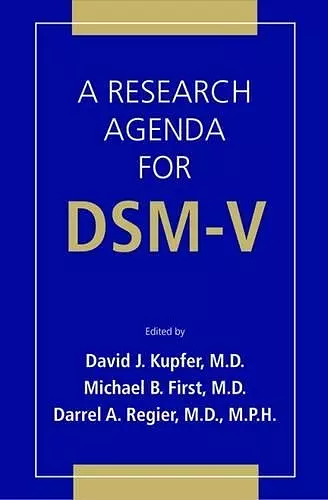A Research Agenda For DSM V
Michael B First editor David J Kupfer editor Darrel A Regier editor
Format:Paperback
Publisher:American Psychiatric Association Publishing
Published:30th Sep '02
Currently unavailable, and unfortunately no date known when it will be back

By engaging an international cadre of research investigators in each of the proposed future diagnostic specific conferences, we hope to stimulate a cooperative research effort that can be supported by multiple national research funding sources. Likewise, by paying greater attention to the potential contribution of diverse research disciplines to clinical disease and disorder entities, even those defined by more transient but testable research criteria, we hope to accelerate the development of a research base that will be maximally informative for future revisions of the DSM and ICD classification systems for mental disorders. From the Introduction
This volume represents a far-reaching attempt to stimulate research and discussion in the field in preparation for the start of the DSM-V process, still several years away, and to integrate information from a wide variety of sources and technologies.
In the ongoing quest to improve our psychiatric diagnostic system, we are now searching for new approaches to understanding the etiological and pathophysiological mechanisms that can improve the validity of our diagnoses and the consequent power of our preventive and treatment interventions—venturing beyond the current DSM paradigm and DSM-IV framework.
This thought-provoking volume—produced as a partnership between the American Psychiatric Association, the National Institute of Mental Health, the National Institute on Alcohol Abuse and Alcoholism, and the National Institute on Drug Abuse—represents a far-reaching attempt to stimulate research and discussion in the field in preparation for the eventual start of the DSM-V process, still several years hence. The book
• Explores a variety of basic nomenclature issues, including the desirability of rating the quality and quantity of information available to support the different disorders in the DSM in order to indicate the disparity of empirical support across the diagnostic system.
• Offers a neuroscience research agenda to guide development of a pathophysiologically based classification for DSM-V, which reviews genetic, brain imaging, postmortem, and animal model research and includes strategic insights for a new research agenda.
• Presents highlights of recent progress in developmental neuroscience, genetics, psychology, psychopathology, and epidemiology, using a bioecological perspective to focus on the first two decades of life, when rapid changes in behavior, emotion and cognition occur.
• Discusses how to address two important gaps in the current DSM-IV: (1) the categorical method of diagnosing personality disorders and their relationship with Axis I disorders, and (2) the limited provision for the diagnosis of relational disorders—suggesting a research agenda for personality disorders that considers replacing the current categorical approach with a dimensional classification of personality.
• Reevaluates the relationship between mental disorders and disability, asserting that research into disability and impairment would benefit from the diagnosis of mental disorders be uncoupled from a requirement for impairment or disability to foster a more vigorous research agenda on the etiologies, courses, and treatment of mental disorders as well as disabilities and to avert unintended...
This book will stimulate research by bringing into play information about updated empirical databases, providing insight into the process of integrating research findings from a classification system that is etiologically based rather than descriptive, and stimulating discussion at all levels, from residents in training seminars to working groups of research investigators around the world.
-- Adrianna Neagoe, M.D., * Psychiatric Services *This is an important guide for anyone involved in psychiatric research as well as the general psychiatrist who wants to understand the history of the DSM system and wanted to learn about the proposed future classification systems. The book is easy to read and done in great detail.
-- Raj Tummala, M.D., * Doody's Health Science Book Reviews *I congratulate the authors of the sis chapters of this book as well as its editors. Without question, this volume represents a far-reaching effort and a good start for the work ahead. One hopes that all of the goals in hand for a successful and well-accepted DSM-V will be met not only in the United States but across the world as well.
-- Pedro Ruiz, M.D., * The American Journal of PsychiatISBN: 9780890422922
Dimensions: 229mm x 152mm x 19mm
Weight: 549g
336 pages